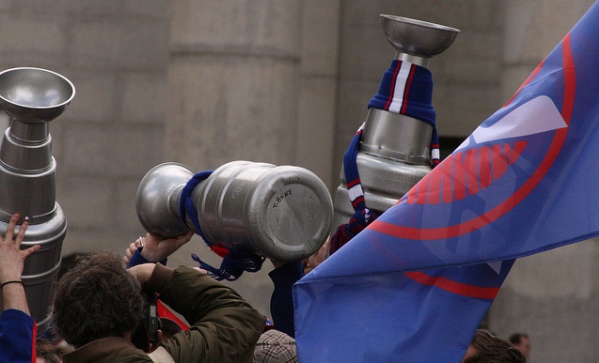As we settle in for the Stanley Cup Final series between the Boston Bruins and Vancouver Canucks, a message of congratulations to Manitoban hockey fans because, following a 15-year absence, a National Hockey League team will once again be hosted by the city of Winnipeg. Whether the new owners opt for the “Jets” name of lore, or the more current “Manitoba Moose,” Georgia’s loss of the Atlanta Thrashers is Central Canada’s gain. The rest of the nation — with the possible exception of Hamilton, Ontario — couldn’t be more pleased.
And now, it’s time for the fine folk of Winnipeg to pay up.
Don’t be misled by Tuesday’s celebratory visuals of hooky-playing teens at The Forks: The NHL’s return to Winnipeg is not a done deal yet. The league’s Board of Governors, comprised of individual team owners, still has to give its collective blessing via a vote scheduled for June 21. Reasonably, the franchise’s new owners, Mark Chipman and David Thomson of True North Sports and Entertainment Ltd., need to demonstrate that the region can support an NHL squad.
Enter the “Drive to 13,000” campaign. In what felt like nanoseconds after the joyous purchase-and-relocation announcement, True North’s president launched a push for residents in and around Winnipeg to purchase season-ticket packages. A commitment of three to five years, and monetary deposit, is required, immediately. The goal is to offload — you guessed correctly — 13,000 ticket packages in three weeks.
Seems a bit crass though, doesn’t it? Smells a bit of blackmail, too. Frankly, the Thrashers have nowhere else to go but Winnipeg (if they did, most believe the NHL would have chosen the other option) and the Board has little choice but to approve the sale and relocation. Relative emptiness notwithstanding, a threat still carries a distinctly offensive odour.
Is this an entirely inappropriate ultimatum, otherwise? From expanding player salaries to a deflated Canadian dollar, Winnipeg simply could not support an NHL team in 1996. Before being sold to Jerry Colangelo and relocating to Phoenix, the club failed to attract a local owner — despite a passionate fan-base and government financial support. That Jets organization was a huge financial failure.
By NHL standards, the MTS Centre is teensy, while the Winnipeg market is downright weensy. NHL Commissioner Gary Bettman’s observation that the new Jets/Thrashers won’t be financially viable unless their arena sells out, each and every game, is condescending but correct. The League, Chipman and Thomson (just because he’s a gazillionaire doesn’t mean he should be asked to take a bath on this venture) are not wrong in requesting a tangible local-market commitment. Particularly Chipman, who has worked patiently, persistently and respectfully for years with the goal of bringing the NHL back to Manitoba, shouldn’t be left on the financial hook for simple reasons of etiquette. (The man also shouldn’t be left to buy his own beer in the province, ever again.)
Fortunately, the respective contemporary NHL and Winnipeg climates are different today. A league-mandated salary cap and revenue sharing plan gives this newest hockey club an economically competitive chance, while the city itself is growing amidst lower unemployment. The plump Canadian dollar doesn’t hurt, either.
Still, the only way the new organization will survive beyond its first few years is if local hockey fans cough up for those multi-season ticket packages. You got your wish, Winnipeg: The “Jets” are landing again. Now it’s time to put your money where your mouth is — and your cold cash at front-and-centre ice.
——————–
Image courtesy of seniwati.



Great read. Will definitely share this link. Thanks.